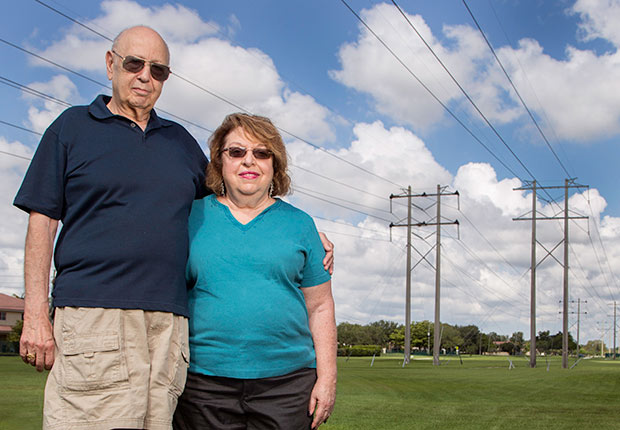AARP Eye Center

By Dan Tracy
Harold and Joyce Salomon have been customers of Florida Power & Light (FPL) since they retired to Coral Springs 20 years ago. They oppose its request for a $1.3 billion rate increase that would be phased in over four years starting in January.
“They are doing excellently,” Harold Salomon said of FPL’s finances. “They don’t need an increase.”
Salomon, 79, a retired air-conditioning engineer, has owned FPL stock for years and tracks the performance of the utility’s parent company, NextEra Energy Inc., of Juno Beach, on the New York Stock Exchange. NextEra stock has risen from $56 a share five years ago to the neighborhood of $120 recently.
This is the third time in seven years that FPL has sought higher rates. Four years ago, the company won a $965 million increase from the Florida Public Service Commission (PSC). In 2009, the utility got a $300 million raise.
The five-member PSC has the final say on the rates of investor-owned electric utilities in Florida. The agency held a series of public hearings in June to discuss the request and will hold an administrative hearing in Tallahassee beginning Aug. 22.
FPL, which is the state’s largest electric utility and serves over 10 million Floridians, said in a filing with the PSC that it needs the extra money to modernize and upgrade combustion turbines and peaking units, which produce energy to meet peak demands, and to build three solar centers.
The utility said it also intends to use the rate increase for its Okeechobee Clean Energy Center—fueled by natural gas produced in the United States—which is supposed to be running by mid-2019.
“The tangible benefits we provide our customers and the state of Florida are the direct result of smart long-term investments we’ve made in advanced infrastructure and cost-saving efficiencies,” said FPL spokeswoman Sarah Gatewood, indicating the improvements will ultimately save customers money.
Salomon does not find the utility’s argument persuasive. “They don’t need a raise,” he said.
Several groups opposed
He is not alone in his opposition. Several organizations, including AARP, have been granted intervenor status by the PSC, which means they can present written and oral testimony to the commission.
“We believe FPL is asking too much of consumers,” said Jeff Johnson, AARP Florida state director. He noted that AARP plans to alert consumers throughout the summer about the significance of the rate hike request.
The Florida Industrial Power Users Group was part of the 2012 settlement that the PSC approved over the objections of J.R. Kelly, who, as the state’s public counsel, represents the interests of consumers before the PSC.
Jon Moyle, a Tallahassee attorney for the power users group, said FPL is asking for too much money this time. His organization made the same argument four years ago before agreeing to the deal that got the utility $965 million.
So what’s the right amount this time? “I can tell you what it’s not. It’s not $1.3 billion,” Moyle said.
Public Counsel Kelly contends that FPL’s guaranteed profit would go beyond the current 11.5 percent—the midpoint of an allowed range from 10.5 to 12.5 percent—to 12.5 percent if it is granted the entire increase. That would make the company among the most profitable utilities in the country.
“They don’t have to be earning at the high point of their profit range,” Kelly said. “That’s not how rate making works.”
But FPL, on its website and in media releases, said the increase would amount to only 44 cents a day more for a consumer who uses 1,000 kilowatt hours monthly.
Such customers, the company said, would still pay less, on average, in 2020 ($107) than they did in 2006 ($108). Kelly said the typical bill should not have much bearing on the PSC board. “The setting of rates to be fair, just and reasonable should not be based on rhetoric, but on evidence presented at the hearing before the PSC.”
To voice your opinion with the PSC, go to action.aarp.org/FPLratehike.
Dan Tracy is a freelance writer living in Orlando, Fla.























































